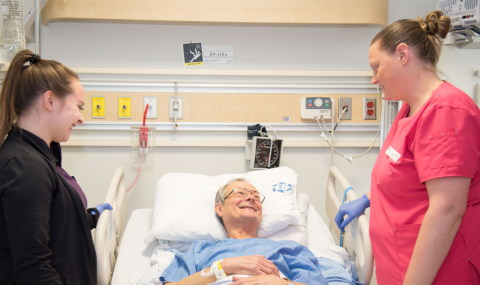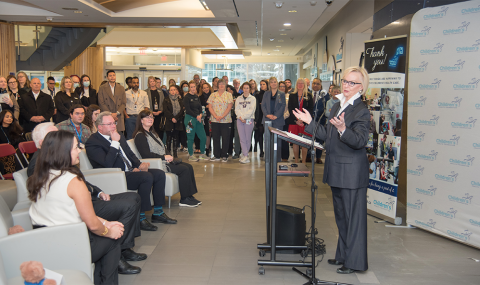MEDIA RELEASE
For Immediate Release
April 27, 2018
LONDON, Ontario – Given just 24 hours to live after his first liver transplant was unsuccessful, the clock was ticking for Doug Ferguson. His family held vigil at his bedside as the hours passed by – 24 came and went, then 48, and 72, and finally at 96 hours, while on the brink of death, they received news that another liver was on its way.
Following the second liver transplant which was successful, Ferguson is alive and well today thanks to the Multi-Organ Transplant Program team at London Health Sciences Centre and the donor family who made the gift of life possible. For recipients like Ferguson, April’s Be A Donor month is an incredibly meaningful and important opportunity to raise awareness about registering your consent to be a donor and speaking with your family members about your intentions.
“I never knew how strong an emotion that gratitude can be,” says Doug Ferguson. “It’s gratitude to the families of the organ donors and gratitude to the doctors, nurses, and staff. That profound sense of gratitude has inspired me to do whatever I can to encourage people to register their consent to donate and to share those wishes with their loved ones.”
Ferguson’s transplant journey began when a tumour was found on his liver in early 2014. Initially not a candidate for transplant because of the tumour’s size, he became eligible after success from a special form of chemotherapy called transarterial chemoembolization, and was placed on the transplant list in September of the same year.
At the end of that November while down to just 20 per cent liver function, he received the call that he and his family had been hoping would come – a liver was on its way for him. He underwent his first transplant surgery where an extremely rare case of hyper-acute rejection took place. Hyper-acute rejection occurs within minutes of transplantation as a result of how antibodies in the organ recipient’s blood stream react with the new organ, leading to organ failure within hours. Placed into a medically-induced coma, the team did what they could to keep him alive through complete liver failure, while his family held vigil at the bedside. After an agonizing 96 hours, word was received that a second liver was on its way. It’s a day his family calls miracle day.
This second surgery, performed by LHSC transplant surgeon Dr. Douglas Quan, was a success. Ferguson remained in his medically induced coma for another 10 days to allow his body the rest it required to begin to heal and ensure the new liver would achieve optimal function.
“Waking up in early December and seeing my family was one of the greatest joys of my life,” says Ferguson. “It was the start of a long road to recovery, but I had never been so grateful. I received the gift of life and it has allowed me to survive to spend time with my loved ones and to continue the pursuit of access to justice through my law career. My gift of life allowed me to survive to meet my first grandchild, thanks to the generosity of others.”
He adds, “I consider my donor and the donor’s family to be heroes for saving my life. My donor is a hero for registering to be a donor, and the family members are heroes for following the donor’s wishes.”
The Multi-Organ Transplant Program at LHSC is one of the leading transplant programs in Canada. Since its first kidney transplant in 1973, more than 5,500 Canadians have received organ transplants at LHSC, including kidney, liver, heart, kidney-pancreas, pancreas, and multi-organ transplantation.
The London region has one of the highest organ donation rates across all of Canada. Yet, in order to continue helping patients, LHSC needs to continue increasing public commitment to discuss organ donation wishes with family members and also register consent.
“LHSC’s transplant program is an incredible legacy that I’m proud to be a part of,” says Dr. Quan. “One of the most important aspects of what’s made our rich transplant history possible is the donors and their families. Simply put, we couldn’t do what we do without them. Each April gives us the chance to remind our community that there is a real need for people to register and share their consent to donate, and I think recipient stories like Doug’s are a great way to meaningfully demonstrate the difference that organ donation can make in the lives of others.”
About London Health Science Centre
London Health Sciences Centre has been at the forefront of medicine in Canada for 143 years and offers the broadest range of specialized clinical services in Ontario. Building on the traditions of its founding hospitals to provide compassionate care in an academic teaching setting, London Health Sciences Centre is home to Children’s Hospital, University Hospital, Victoria Hospital, the Kidney Care Centre, two family medical centres, and two research institutes – Children’s Health Research Institute and Lawson Health Research Institute. As a leader in medical discovery and health research, London Health Sciences Centre has a history of over 65 international and national firsts and attracts top clinicians and researchers from around the world. As a regional referral centre, London Health Sciences Centre cares for the most medically complex patients including critically injured adults and children in southwestern Ontario and beyond. The hospital’s nearly 15,000 staff, physicians, students and volunteers provide care for more than one million patient visits a year. For more information visit www.lhsc.on.ca
-30-
For media inquiries contact:
Mandy Gelinas
Corporate Communications and Public Relations
London Health Sciences Centre
519-685-8500, ext. 75157
Mandy.Gelinas@lhsc.on.ca
After-hours and weekend assistance:
Call LHSC Switchboard at 519-685-8500 and ask to page the communication consultant on-call.
Like us on Facebook at London Health Sciences Centre (LHSC), follow us on Twitter @LHSCCanada and watch us on YouTube at LHSCCanada.


